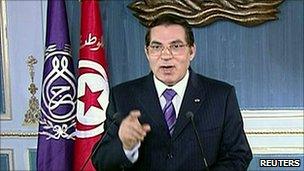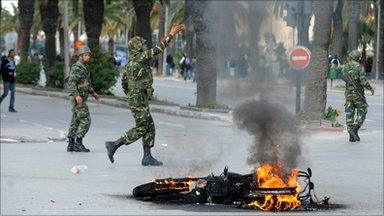Tunisia revolt: Fear and rejoicing in Tunis
- Published

President Zine al-Abidine Ben Ali led Tunisia for 23 years
Tunisia has had three presidents in the past 48 hours.
A legitimate one: Zine al-Abidine Ben Ali, re-elected in 2009 with 89.4% of the vote; an illegitimate one: Mohammed Ghannouchi, who took on the job on Friday even though the decision to do so contravened the Tunisian constitution; and now an interim one: Foued Mebazza, who as Speaker of the Tunisian parliament should have been given the job as soon as Mr Ben Ali was removed from office.
Now the interim President, Fouad Mebazza is working hard to put together an acting government ahead of elections which are due to be called within three months.
These are very uncertain hours in Tunisia. The country has been thrown into turmoil by a series of cataclysmic events which unfolded in the space of a few hours. That uncertainty is very apparent on the streets of the capital, Tunis.
In residential areas it looks as though mobs of stick-wielding thugs are on the loose, but on closer inspection it soon becomes clear that these are not hoodlums, but respectable, upstanding members of the community who have been reduced to desperate measures to protect their property.
I spoke to a doctor who was carrying two rocks and a wooden club in his hands.
"Do you think I want to do this?" he asked me. "Of course I don't, but I have been out here night and day for the past 48 hours. There are gangs of criminals on the loose and I have to look after what is mine."
I asked him about the police - where they were, and shouldn't they have been protecting his home?
"The police are nowhere to be seen, and anyway, they are part of the past," he said. "They were the foot soldiers of Ben Ali so no-one trusts them."
Crimewave
The immediate future of Tunisia is in the hands of the military. That is not to say they were part of the process that saw President Ben Ali flee. This was not a coup.
But his sudden departure, preceded by the dissolution of the government and the Tunisian parliament, has hurled the country into a crisis of unprecedented proportions and it needed some powerful institution to assert control. That is what the army is trying to do.

The military is respected in Tunisia, unlike the police
For the most part, the military is respected in the country, unlike the police who are reviled. So Tunisians have some understanding and tolerance for the numerous military checkpoints that they now have to go through to get from one side of Tunis to the other.
The army is trying to limit the inevitable crimewave that follows on the heels of a government collapse. There is looting, theft and general abuse happening everywhere.
As we were driving into Tunis after a journey to Hamamet we saw dozens of youths carrying boxes of yoghurt across the motorway. They were stealing from a dairy that had been abandoned in the turmoil. Soldiers had just arrived and were firing in the air to persuade the thieves to stop.
Tanks have been parked outside the state television headquarters, next to government buildings and at many main road intersections.
'We have made history'
Despite the fear and uncertainty, there is a powerful sense of achievement and rejoicing - particularly among the young. At the start of the wave of protests in the country which began four weeks ago, few would have expected to topple a government and a president who had been in power for 23 years so quickly.
Mr Ben Ali has become so much a part of national consciousness that some fear there is still a risk he might come back, that he hasn't been written out of Tunisia's story completely. All I spoke to were determined not to let him.
I spoke to a young man, Alaedine Derbala, one of a group who were standing armed with sticks and stones to protect their homes.
"We have made history," he said, "January the fourteenth will go down as a great day for Tunisia, the day we changed the country for ever.
"We got rid of a hated man and his hated family. Now we have the possibility of creating a new country.
"We have martyrs who have died for this and we can't let them down. So we cannot allow this to falter."
Alaedine expressed a view I have heard everywhere: too much has been sacrificed and too much blood has been spilt to let the hope of a democratic future fail.